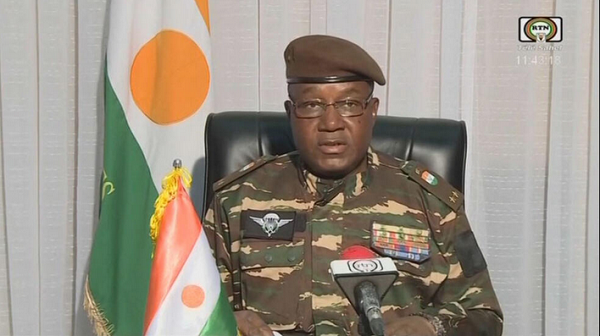Niger’s junta rescinds agreement for a U.S. military base, opening door for Russian troops
Niger’s military junta has cancelled its agreement with the Pentagon for a strategically important U.S. drone base in its northern deserts, opening the door for Russia to further bolster its growing troop presence in West Africa.
The base, built by the United States in 2016 at a cost of US$110-million for counterterrorism operations in West and North Africa, has held as many as 1,100 U.S. troops in the past. It reportedly holds about 650 personnel today.
Niger’s junta, which seized power from a civilian government last July, issued a statement accusing the United States of seeking to prevent it from negotiating a security deal with its preferred partners – a clear reference to Moscow, which has steadily expanded its military co-operation with Niger since the coup.
Niger has already abandoned its other Western allies, ejecting more than 1,000 French troops from the country after the coup.
Russia, using military contractors as its proxies, had earlier deployed thousands of troops on the territory of Niger’s close allies and neighbours, the military regimes of Mali and Burkina Faso, and another nearby country, the Central African Republic. It is now expected to add Niger to the growing ranks of its African military partners, possibly setting the stage for a Russian troop deployment in the country.
A spokesperson for Niger’s regime, Colonel Amadou Abdramane, said in a statement on state television on Saturday that the U.S. military presence was “illegal” and was based on an unfair agreement that had been unilaterally imposed on Niger in 2012.
He said Niger had revoked the base agreement “with immediate effect,” terminating its permission for the Pentagon’s military and civilian personnel to be stationed in the country.
It is unclear whether the United States will fight the order and try to keep its base open. A delegation of senior U.S. officials visited Niger’s capital, Niamey, for three days last week in a failed attempt to reach a new agreement with the junta.
Niger had been a strong Western ally before the coup last year, with Western countries spending hundreds of millions of dollars on military aid to Niger. Canada has had a close relationship with Niger’s military for years, and Canadian special forces soldiers have provided training to Niger’s soldiers at an annual U.S.-sponsored training exercise in West Africa.
After the coup, Canada eventually pulled its handful of troops out of Niger, but the U.S. delayed any decision on its drone base, hoping to reach an agreement to keep it functioning. The base is considered crucial for surveillance of Islamist radical groups across the Sahel region and as far north as Libya.
The U.S. delegation last week, including top diplomats and the U.S. military commander for Africa, was unable to secure a meeting with the junta’s leader, General Abdourahamane Tchiani, and cancelled a scheduled press conference before its departure. The junta said the U.S. delegation was “condescending” and had threatened retaliation if it didn’t get its way.
The junta spokesperson, Col. Abdramane, said the U.S. delegation was pressing Niger to abandon any possible military agreements with Russia or Iran. He said the regime had a right to acquire Russian weapons for its fight against Islamist extremist groups.
U.S. State Department spokesperson Matthew Miller said his department was aware of the junta’s statement about the revoking of the base agreement. He said the statement came after “frank discussions” about the U.S. concerns over the “trajectory” of the Niger regime. The U.S. is still “in touch” with the junta, he said in a social-media post on the weekend.
Analysts said the Niger decision is a major blow for the United States. “Niger’s announcement leaves a gaping hole in U.S. operational capacity in Africa,” said Will Brown, senior fellow in the Africa program of the European Council on Foreign Relations.
He said Niger appears to be positioning itself on Russia’s side of the geopolitical rivalry. “Niger’s allies in the Malian and Burkinabe military juntas have probably put some serious pressure on Niger to follow through on this,” he told The Globe and Mail.
The United States will be reluctant to allow its drone base to fall into foreign hands, potentially including Russian hands, and it could make life difficult for the Niger junta if negotiations collapse, he said.
After each of the coups in the Sahel region over the past three years, Russia has been able to expand its military and economic presence. In Mali, it deployed about 1,000 troops from the Kremlin-linked Wagner Group, beginning in late 2022, and gained control over a key mining operation. In Burkina Faso, it deployed more than 100 soldiers to the country this year, calling them “instructors.” It also signed a deal to build a Russian nuclear plant in Burkina Faso.
This article was first reported by The Globe and Mail













